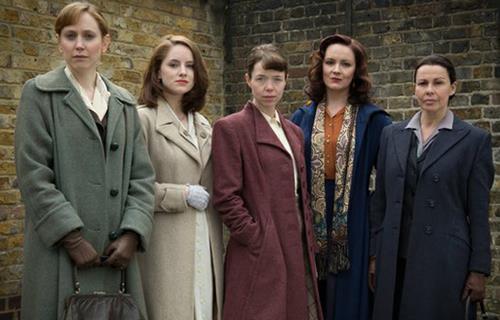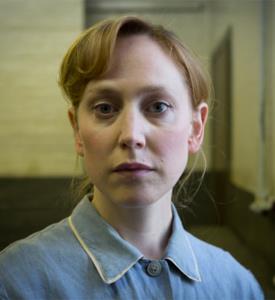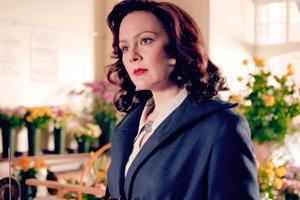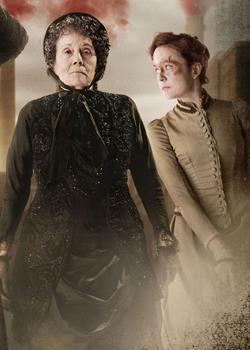
[Editor's Note: TVWW contributor Donna J. Plesh died April 2, 2015, from ovarian cancer. She was 71. Donna covered television since the early 1980s, initially for the Orange County Register and its TV magazine. She also was a member of the Television Critics Association. Donna was always a cheerful spirit within the TVWW network and often gave readers a kind, up-close viewpoint in her interviews with a wide variety of television stars. She will be missed.]
During World War II, women played a major role in the fight on the home front, be they the Rosie the Riveter types working in airplane factories in this country, or the women who worked as code breakers in Britain.
The Bletchley Circle, beginning season two on PBS Sunday April 13 at 10 p.m. ET (check local listings), tells the story of one small group of women who were code breakers during the war, and reunited in the early 1950s to use their talents to solve crimes in London. Season one stars Anna Maxwell Martin, Rachael Stirling, Sophie Rundle and Julie Graham return, and are joined in the new season by Hattie Morahan, playing a fellow former code breaker.
In an interview this past January, Stirling and Morahan shared some of their thoughts about acting and the series, which returns with four new episodes.
Stirling (left), who stars as Millie, said she knew she wanted to be on the series after reading the script.
“I was doing a play at [London's West End theater] the Donmar Warehouse, and all the other girls in the dressing room were reading the script and my agent hadn’t gotten me the script. So when I got it I read it and I loved it and pulled a hissy fit and insisted that he get me a meeting with the producer.
"When I got the interview I marched in and said to Jake [Lushington, the executive producer], I’m Millie, and he gave me the job,” she said.
Morahan, who plays new character Alice, said she had been a fan of the series.
 “I had seen the first series and loved it. Jake had seen me in a couple of theater shows and I also knew the director of the first two episodes of the first season. I just loved the script, loved the character. I think it helps if they know your work already,” she added.
“I had seen the first series and loved it. Jake had seen me in a couple of theater shows and I also knew the director of the first two episodes of the first season. I just loved the script, loved the character. I think it helps if they know your work already,” she added.
Both London born, the actresses said they knew very little about the women who were code breakers during the war years.
“Unless you read history books, it sort of seeped through popular culture through films like Enigma,” said Morahan (right). “It is something one gradually learns about but I had no idea — until having to research for this role — the scale of the enterprise and the number of women who were there, and all the different types of work that was being done there. It was absolutely fascinating.”
Stirling concurs. “I didn’t really know anything. I was pretty ignorant about it. But it is a fascinating thing and I really think schools should teach it. But what’s great about this show is that it has raised the profile of Bletchley Park [a British heritage site and tourist attraction where visitors can see some of the World War II code breaking huts where the code breakers worked].”
The important role the women code breakers played in the war effort, and the fact that women are the stars of the drama, appealed to both actresses. “The women [in the series] are complex in their own lives and their relationships aren’t crudely drawn and detailed. I find that so unusual. So often there are one or two female parts and they can be stock types and they are sort of serving as a function for the male protagonist,” said Morahan.
 “And you are always a foil to the man — you are sort of married to the main man or the girlfriend or mistress or whatever. And this [series] is absolutely not seen from that vantage point. It’s about these women who were incredibly intelligent but resourceful and pragmatic during the war and about their collective disappointment [after the war ended],” said Stirling, adding, “I think Britain as a whole went through a kind of slump. You win a war and there is a high.
“And you are always a foil to the man — you are sort of married to the main man or the girlfriend or mistress or whatever. And this [series] is absolutely not seen from that vantage point. It’s about these women who were incredibly intelligent but resourceful and pragmatic during the war and about their collective disappointment [after the war ended],” said Stirling, adding, “I think Britain as a whole went through a kind of slump. You win a war and there is a high.
"And actually, the reality is that for years after there is rationing — the world is a pretty bleak place — and you see that world through the eyes of these women, who are experiencing total disappointment and uselessness where once they were integral in something. So that is the weight that they carry with them. And we see London through their eyes, and I think the sort of level of disappointment and uselessness is really the thing that all the characters have in common,” she said.
“And there was the burden of the secret [Britain’s Official Secrets Act which the code breakers at Bletchley had to sign and which prevented them from revealing to anyone what they were doing, and had done, during the war for decades after]. I think that is so interesting. The characters are bound by it, and I think that is something interesting and appealing from an audience point of view, since they [the audience] are in on the secret, and seeing people who don’t know who these women are and who don’t know their history and don’t know their capabilities [like the police], and, you know, writing them and their theories off,” added Morahan.
Both Stirling and Morahan have acting in their genes. Stirling’s mother is actress Diana Rigg, and her father Archie is a theater producer. Morahan’s parents are actress Anna Carteret, and her father is stage and film director Christopher Morahan. And, yes, both actresses said they knew early on they wanted to act.
“If I am honest, I think I have always wanted to act. I think the thing about being exposed to it as a child is that it is just there in your field of vision, and you think ‘Oh, maybe I can do that.’ So when I would go to the theater I would say ‘So when I play that part,' I would image how I would do it, very pompously,” said Morahan. Her first acting role was in a television drama. Then she was cast in The Peacock Spring, a movie shot in India and directed by her father. But much of her acting has been in the theater, and earlier this year she played Nora in Ibsen’s A Doll House on stage in New York City.
Acting was something Stirling said she knew she always wanted to do.“ My mom would say when asked, ‘is your daughter going to be an actress?,’ and my ma would go, ‘No.’ But I remember being dressed in swaddling clothes playing Mary trying to elbow Joseph off the stage because I didn’t like him. We would study Antony and Cleopatra [in school] and I found I just couldn’t write an essay about what I think about Cleopatra, but I can read it out loud in class and that way I can tell you what I think she is feeling. I understand analyzing a text sort of for educational purposes but I am of the ‘Come on, let’s get up and do it’ mentality, so yeah I always did want to act,” she said.
 Stirling’s first film acting job was in the movie Still Crazy. “It was about a rock band. It was sort of like Spinal Tap. It was written by Dick Clement and Ian La Frenais and it had this unbelievable cast [Stephen Rea, Billy Connolly, Timothy Spall, Bill Nighy] and I did not know what I was doing. The director was so busy dealing with all these big egos. I was quite old [20] and I was at university at the time. And we [the actors] were all on this sort of mocked up tour bus at Pinewood Studios for weeks on end. I remember the first day I was told to hit my mark and I was too proud to say ‘What does that mean?’ There were a lot of big characters there so I sort of fell a bit by the wayside and got a bit lost along the way,” she said. More recently, Stirling has appeared in the films Snow White and the Huntsman and Salmon Fishing in Yemen. And, yes, she and her mother have acted together — once — in an episode of Dr. Who (at right).
Stirling’s first film acting job was in the movie Still Crazy. “It was about a rock band. It was sort of like Spinal Tap. It was written by Dick Clement and Ian La Frenais and it had this unbelievable cast [Stephen Rea, Billy Connolly, Timothy Spall, Bill Nighy] and I did not know what I was doing. The director was so busy dealing with all these big egos. I was quite old [20] and I was at university at the time. And we [the actors] were all on this sort of mocked up tour bus at Pinewood Studios for weeks on end. I remember the first day I was told to hit my mark and I was too proud to say ‘What does that mean?’ There were a lot of big characters there so I sort of fell a bit by the wayside and got a bit lost along the way,” she said. More recently, Stirling has appeared in the films Snow White and the Huntsman and Salmon Fishing in Yemen. And, yes, she and her mother have acted together — once — in an episode of Dr. Who (at right).
While their work takes up much of their time, the actresses do occasionally get to sit down and watch the “telly.” “I have been doing lots of theater in the last year so I have many series stacked up to watch. I loved the last series of Mad Men. I have watched that from the start. I am totally besotted with it, and I love Veep,” said Morahan.
Stirling’s also a TV fan. “I love telly! I am into The Bridge and The Killing. There is this amazing French series called the The Returned. But sometimes I go through phases of watching The Real Housewives of Beverly Hills for hours, and my mum is watching it, too... So I go through phases of highbrow and then real lowbrow,” she said.
How about the worldwide hit Downton Abbey? “I watched the first series and some of the second. There’s just not enough time in my life, so after a while it is difficult to watch it,” said Morahan. Stirling said she is a fan of Downton star Maggie Smith. “I love watching Maggie. I turn it on and watch her scenes. She makes me howl. It is an amazing export … it has done fantastically well, but I like things that are a bit dark, Brideshead Revisited, that original series. I found it really moving,” she added.
Many on this side of the pond often think of British actors as being more staid, more dramatic and more stiff upper lipped, if you will, but that is not always the case with these actresses. Take Morahan and Michael Jackson.
“As a child, I was obsessed with Michael Jackson and taught myself to moonwalk. And even today if I am on a shiny floor and I am wearing socks, I can still bring it on!” she said.
Then there is Stirling and boxing. Yes, boxing.
“I am quite good at boxing. I go boxing with some pretty massive dudes with cornrows in my all-stars boxing, and I manage not to get hit too much. And I can do ballet! And I speak Russian because I wanted to read Chekhov in the original,” she said.